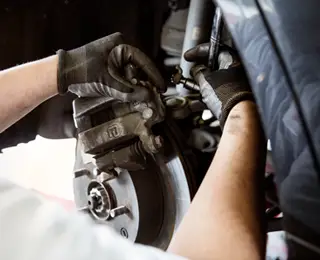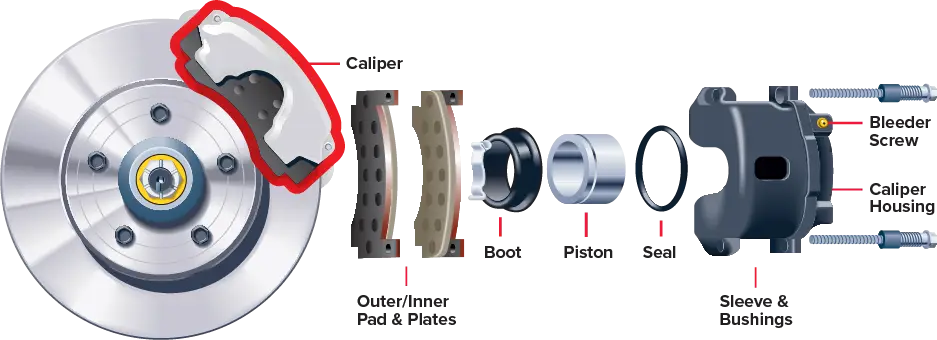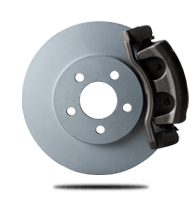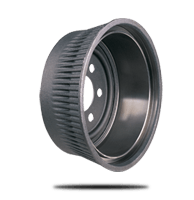You have already added that item to your appointment.

You have already added that item to your appointment.
Your brakes are some of the most important safety features on your vehicle. When you keep them maintained and replaced or repaired regularly, they’ll be there when you need them. If you often ask yourself, “Where can I get my brakes done?” and how often, Les Schwab has the answers.
Your car or truck has a lot of important moving parts. Those include your tires, wheels, shocks, struts, and brakes. Like those other parts, your brakes require periodic inspections, repairs, and replacements. See 8 Signs You Could Have Brake Problems.
During a regular inspection, a trained technician should visually inspect your brakes and fluid reservoir levels (found in your engine compartment or other location on electric vehicles). If work needs to be done, you should receive a complete breakdown of the cost and time needed to inspect and repair your disc brakes, drum brake assemblies, as well as any other types of brakes and components.
At Les Schwab, we take your brakes seriously, offer free visual inspections, explain what we find, what’s needed to get them working properly, and provide an estimate.
When it comes to the cost of repairing and replacing brake parts, there are many factors to consider. Overall, costs may be more than $500 per axle, depending on the service provider and name on the building. If you go to a dealership, you’re likely to pay more.
Les Schwab goes beyond the basics of brake repair to ensure you get exactly what you pay for. Unlike many other shops that only replace the brake pads or friction material, we do the whole job. That includes cleaning and inspecting all of the wearable components, replacing the brake fluid as well as calipers when parts that meet the original manufacturer’s specifications are available. For your added safety and to get the most out of your brakes, we can either resurface the rotors or drums or recommend replacement.
While there isn’t a hard and fast rule for the proper interval between brake services, most professionals recommend you get yours inspected regularly (annually, if possible) or when you get your tires rotated (every 5,000 miles). If you notice an issue with your brakes, stop by Les Schwab and we’ll take a look.
Additionally, keep these brake service tips in mind:
Recommendations and costs for brake service can be all over the map. So don’t be afraid to ask questions. You deserve to know what you’re paying for. Here are some areas to consider whenever you get your brakes serviced, repaired, or replaced.
Some shops advertise a low price, but the work may only cover brake pad replacement. However, if any other problems are discovered, the cost goes way up. A good brake job should also include caliper replacement, flushing old brake fluid, adding new fluid, resurfacing rotors, and adjusting braking mechanisms.
How many days will it take for the garage to get you on their schedule? Can they offer same-day service for the work? When you book an appointment at Les Schwab, we’ll give you an estimated timeframe and do our best to work with your schedule.
With people holding onto cars longer, a brake repair warranty can mean a lot. Ask for specifics on the brake warranty before the service. If it’s a lifetime warranty, does that cover the parts and labor? Are free brake inspections included? The Les Schwab Brake Warranty covers both parts and labor, free visual inspections, and more.
At Les Schwab, If we can’t guarantee it, we won’t sell or service it. Everything we do is done to earn your trust and keep you and your family safe. That includes your brakes. Remember, a good mechanic or brake repair shop will be happy to explain what your brakes need to work properly and what it will cost. Schedule an appointment at your local Les Schwab, and we’ll get your brakes done right the first time.
Where you drive, how you drive, as well as the quality of the parts and service are some of the most common factors in how long brakes last and when you need to service or replace them.
There are big differences in how brake service and repairs are done. It’s pretty common at most brake repair shops to simply pull the calipers off, replace the brake pads, and reinstall the unit.
But there are many parts of the brake system that work just as hard as the brake pads. Those parts could also need attention. For example, built-up grit on pistons can result in brake pads that do not engage or disengage properly when you use the brake pedal. Additionally, heat from the action of the piston can break down the rubber seals, creating a leak in the braking system. That could result in brake failure over time.
It’s not easy to inspect all of these parts — like boots, seals, bushings — without full disassembly. Taking everything apart is time-consuming. It also increases the number of things that can go wrong.
A better option is replacing all the brake components with a unit made to your vehicle’s original specifications. This heads off any problems with other parts wearing out before your next brake service.

The brakes on your car or truck are very important. The professionals at Les Schwab are happy to give yours a free visual inspection if those brakes aren’t responding like they should. Have questions about your brakes? We’ve put together answers to some of the most common brake questions we get at Les Schwab.
At Les Schwab, our specially trained professionals do the following to ensure brake performance and your safety.

If your brake light is on, your brakes are squeaky or grinding, if they feel like they are pulsing or grabbing, or they feel “soft” when you hit the brake pedal, don’t wait on a brake check. It not only can be dangerous to ignore such warning signs, small brake problems left unrepaired can lead to expensive damage to other parts of your braking system. The only way to determine if brake noise is harmless or hazardous is to have a thorough brake inspection.
Les Schwab offers the latest diagnostics and repair equipment in the industry for most types of brake systems. Our technicians are trained to get disc or drum brakes working properly on whatever you drive — passenger car, SUV, or light truck, old or new models.
Brake pads are metal plates bonded with sturdy cushioning friction material. The pads are located on each side of the brake rotors — the flat, rotating discs that are attached to the vehicle’s wheels. When you press the brake pedal, the caliper — essentially a clamp housing the pistons and pads — activates the brake pads, sandwiching the rotor. As the pads come into contact, they slow the spinning rotor through friction, which in turn stops the wheels.
New as well as remanufactured calipers designed to be equal or better than original equipment (OE) include new seals, hardware, and brake pads. This provides better caliper operation for proper brake performance.
Remanufactured brake calipers use a thoroughly cleaned and inspected original equipment metal caliper housing with new brake caliper hardware and seals. Les Schwab uses premium brake parts manufactured to be consistent with Federal Safety Standards for quality, performance, and safety.
Whenever possible, we resurface rather than replace rotors, to save you money when new parts aren't necessary. Resurfacing provides a proper finish for new brake pads to mate with, helping prevent brake vibration and pulsation. When a rotor is worn beyond specifications, we install original equipment equivalent replacements.
Brake fluid naturally attracts moisture, which can penetrate sealed systems. When it does, it causes the brake fluid boiling point to lower, increasing the chances of corrosion and poor braking. We replace the brake fluid to help reduce this risk, and to prolong the life of brake components.

Drum brakes work much like disc brakes, by applying friction to a spinning surface to slow and then stop the vehicle’s momentum. In drum brakes, brake shoes press against the inside of a drum instead of a rotor to create this braking action.
Drum brakes work using springs which hold brake components in place and return them to position when the brakes are released. Heat affects the spring tension over time. Drum brake hardware is replaced so the brake shoes are held in the proper position, evening out wear and reducing brake drag (failure of the brakes to release completely when the driver’s foot is removed from the pedal).
Whenever possible, we resurface rather than replace drums, to save you money when new parts aren’t necessary. Resurfacing the drums provides a proper finish for new brake shoes and helps prevent brake vibration and pulsation. We also offer original equipment equivalent replacement drums if they are needed.
Brake fluid naturally attracts moisture, which can penetrate sealed systems. When it does, it causes the brake fluid boiling point to lower, increasing the chances of corrosion and poor braking. We replace the brake fluid to help reduce this risk, and to prolong the life of brake components.
Les Schwab knows brakes. Our service professionals will take a look and tell you exactly what they find. If your brakes don’t need any work, we’ll let you know and send you on your way. If your brakes do need some attention and service, we’ll show you all of your options along with a cost estimate.